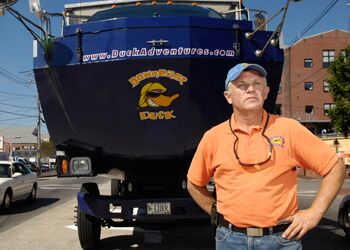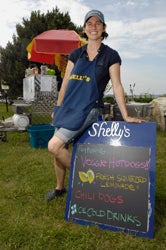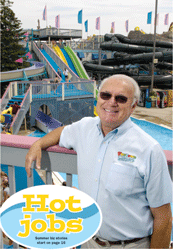Summer is the season for winter-beaten Mainers to relish some of the smaller but perhaps more satisfying pleasures: picking raspberries, hiking blueberry-covered mountains, diving into an ocean wave, barbequing at dusk, slapping mosquitoes while sitting at outdoor concerts — the list is long. Work, while never quite an afterthought, becomes a little less pressing. â&Copy;
But there are others who experience summer as a high-adrenaline, make-it-or-break-it time. For many of these summer people, their income dries up after Labor Day, and what they have in the bank is what they have to live on through the barren months of winter. From about May or June to September, they’re often working seven days a week, as many hours a day as they can.â&Copy;
To learn more about how businesses ramp up for the summer season and then blaze through these hot days, Mainebiz interviewed four seasonal business owners: an amusement park owner, a summer camp director, a tour bus/boat operator and a hot dog vendor. While the seasonal revenues of these entrepreneurs range from $8,000 all the way to $10 million, the four also have some commonalities. For one, they don’t ever truly leave their seasonal businesses behind during the winter and let themselves slide into vacation mode. Rather, they use the downtime for repairs and fix-it jobs, for marketing or future planning, and they always wonder what the next season will bring — what the gas prices will be; how many tourists, summer campers or vegetarian hotdog lovers will come visit.â&Copy;
Summer, while it seems timeless, is a good gauge of the economy’s ups and downs. And summertime business owners are especially dependent on people having the means to do what they love to do during summer — that is, have fun.â&Copy;
JOE STANLEY, OWNER
Downeast Duck Adventures, Portlandâ&Copy;
Founded in 2003, Downeast Duck Adventures offers tours of Portland and its harbor to tens of thousands of paying customers each summer. During the winter, Joe Stanley and his team of three year-round employees build duck boats to sell to other tourism companies. Stanley says they’ve sold one and are closing in on a deal to sell a second. The seasonal tour business generates 70% of his annual revenue.â&Copy;
Trying to fill in those periods during the winter and keeping a staff [is one of the challenges of a seasonal business.] Initially, we tried projecting our market during our offseason, going down south to Tampa, Fla., and West Palm Beach. That was just a lot of travel and we found out it was nice to have some downtime to work on equipment. What we’re doing [in the winter] is just paying the bills, stuff like that, cleaning up the vehicle. â&Copy;
We’ve got two vehicles. One we bought when we started about five years ago, and it was manufactured down in North Carolina. We worked with that for about two years and then we built our own. We engaged a local architect, Roger Long. He designed one for us based on the old World War II DUKW. And that helps keep people busy building, which worked out well. And now we have two vehicles, both are for sale, so we’re a manufacturer/builder — that’s how we stay busy in the winter now. We’d like to sell a couple units and try to keep us going during the winter and keep those valued employees with us.â&Copy;
Mother’s Day is usually the first kickoff. That’s just to get everybody in shape. We go seven days a week, Memorial Day on to Labor Day. Cruise ships have been a great benefit to us during the end of the season. They chose New York, New England, the Maritimes intentionally for insurance purposes to stay out of hurricane regions. That works out for us. We went right to November last year.â&Copy;
Unless it’s a publicly held company, anybody who tells you information is probably lying to you, unless you have something to back it up. It’s private, but I may have alluded to the numbers. We carry 49 seats. Right now most tours are going out with 48 [people] on them. Our season is five months long. We go seven days a week, five times a day. [Editor’s note: At an average ticket price of $20, that adds up to around $470,000 a year in ticket sales, not including tours sold after Labor Day.]â&Copy;
One of the biggest things about a seasonal business is trying to maintain consistency in your own life. When everyone else is getting wound up around you, it’s the beginning of the year and you’re just eating what’s left of the carcass in the spring. You know, it gets hungry and scary. You just have to know it is going to happen. It always does. I’ve been in different types of seasonal businesses, so I brought that [experience] to this enterprise. â&Copy;
It’s just enjoying the business, knowing that people are going to come. They always do. There’s a reason it says Vacationland on the license plate. We’ve always been known as a destination for people to escape large metropolitan areas: Boston, New York, New Jersey. When the Jersey Shore fills up, they don’t want to deal with that, they come up to Maine. Historically, that’s the way it’s been. When the times are good, they kind of bypass Maine. They go to Italy and the Caribbean. It’s funny when times are good the same thing is happening in reverse. We’ll see the Germans and we’ll see people from Europe. So there’s always a constant flow no matter what the economy is doing.â&Copy;
As told to Whit Richardson â&Copy;
Downeast Duck Adventuresâ¨
177 Commercial St., Portlandâ&Copy;
Owner: Joe Stanleyâ¨Founded: 2003â&Copy;
Employees: Three year-round, 12 seasonalâ&Copy;
Service: Duck boat tours of Portland and its harborâ&Copy;
Season: Memorial Day to Labor Day, though Stanley says the tours often run into the fallâ&Copy;
Annual revenue: Between $300,000-$400,000â&Copy;
Contact: 774-3825â¨
www.downeastducktours.comâ&Copy;
MICHELE CASTNER, HOT DOG VENDOR
Shelly’s, Portlandâ&Copy;
Michele Castner is a school psychologist from August to June, and a street vendor during the summer. She says that there are similarities between her two jobs: People tell her their life stories, whether it’s in her office or over a hotdog loaded with relish. In June, she launched her hot dog stand, Shelly’s, near Portland’s East End Beach.â&Copy;
I am a psychological service provider in the Westbrook School Department, and I start up again at the end of August through about mid-June. So I have some summer months to sort of play with. Typically I surf, I relax, I go off on little vacations. But I have been wanting to get some type of summer job, or some sort of part-time job to keep busy.â&Copy;
My dad’s been [running a hot dog stand] for about 15 years in upstate New York. That really isn’t the reason why I started, but he was able to tell me a lot about it. I also, back in the late 1990s, went down to Key West and worked at a smoothie stand. I had a great time. â&Copy;
I actually bought [my cart] off of Craigslist, used. I drove down to New Haven, Conn., to get it. They are hard to find, particularly with the dimensions required by the city of Portland. It cost me about $4,000, and my total investment was between $8,000 and $9,000 [including city and state licenses, insurance and supplies]. I would love to break even, I’d just be happy to break even [this summer]. â&Copy;
What’s it like to run a hot dog stand? Well, there’s my fantasy and then there’s reality. The reality of it is it is really hard work. Your day starts really early, with preparations, getting supplies. The daytime is wonderful because you get to meet so many different people, and what a beautiful place to be in the summertime [she gestures to the sea behind her]. It’s gorgeous. What I imagined, and this is so fancy, I thought I would wake up in the morning early, go for a surf, come back, do what I needed to do to get the hotdog stand ready, go to the beach area, hang out, pack up again and go for an evening surf, I thought it would be a little like that. The reality is my day starts at 7 a.m. and ends at 9:30 at night. I definitely am committed, though, and bearing the bruises and the burns, and it’s getting easier.â&Copy;
The secrets to the trade are to be really well organized, to be well-stocked, to learn from your mistakes, because there will be many in the beginning. And certainly if you can get your friends and family on board to be supportive of you [she points to her friend helping on the grill]. â&Copy;
I really like the people interaction, that’s what I enjoy, that’s what I do for work. You get to know people, a little bit about their life, and that’s the part I enjoy about the work I do during the school year. The difference is here, I’m not writing reports. It’s the people I like, being outdoors, and doing something a little unconventional. â&Copy;
As told to Rebecca Goldfineâ&Copy;
Shelly’sâ&Copy;
Near East End Beach, Portlandâ&Copy;
Owner: Michele Castnerâ&Copy;
Founded: 2008â&Copy;
Employees: Michele, plus some friends who occasionally volunteer â&Copy;
Products: Veggie dogs, veggie chili dogs, hotdogs, sausages, fresh-squeezed lemonadeâ&Copy;
Season: June through August, and weekends in May, September and Octoberâ&Copy;
Projected seasonal revenue: $8,000â&Copy;
Contact: 332-3421
MARK VAN WINKLE, DIRECTOR
Camp Wohelo, Raymondâ&Copy;
Mark Van Winkle’s family has been running Camp Wohelo on Sebago Lake in Raymond for 101 years for girls ages six to 16. Although the summer camp of about 190 full- and half-session campers runs for only seven weeks, Van Winkle — along with his wife, his parents and his sister — work year-round to prepare for a totally awesome summer. â&Copy;
[The camp was] founded here in 1907 by my great grandparents, [Luther and Charlotte Gulick]. We’re one of the oldest camps in the country, maybe the oldest still run by the same family. Our camp name, Wohelo, stands for work, help and love. â&Copy;
The campers arrived on June 19 this year. [Camp ends August 7.] The full-session tuition is $6,700 for seven weeks, $4,400 for half-session. [I do] everything, so many different things: talking to parents some, hopefully getting out, flipping chicken patties. Everybody is helping out; it is a very busy summer business. Every day is kind of unexpected — we plan as much as we can, and then we’re ready for everything as much as we can be.â&Copy;
We’re full-time, all the time, especially my wife and I. We don’t have any time when we’re not doing camp. The biggest investment [leading up to the summer camp] is repair and replacement. We have buildings that are almost 100 years old. When a couple of these wind storms take down all sorts of trees and land on the cabins, we have to repair all that damage. We live on camp year-round; we do travel in the winter for recruitment. But we don’t do a lot of advertising — we use word of mouth, which works well, because it’s a fairly specific thing to be coming here for the long session. More than half our campers are also alumni kids — second, third, fourth generation campers, which is our key. Because the parents, having done it themselves, remember how valuable that time is. â&Copy;
We don’t do a lot of new and different things; we’re a pretty slow-growth business. The tradition of our camp is a lot of what we’re selling and what we do well, so we don’t add a lot of new activities or new things. But we do try to keep some things exciting. We’re doing stand-up paddle boarding this year, using our old wind-surfer boards. You stand up on them and paddle. But no, we’re doing pretty much the same thing we’ve been doing for these 100 years. â&Copy;
We just have one phone line, which means girls aren’t calling out. We collect phones and iPods at the beginning of the summer. No electronics in camp. It is also very hard to charge them since there are no plugs on campus. So there’s not a lot of outside influence at all. The cabins don’t have electricity. You walk to the bathroom, which also doesn’t have electricity. The girls are in their rooms [at home], listening to iPods and IM-ing everyone all the time, and they don’t have to actually live with other people. And here they are living: There are people sleeping next to them, maybe making noise, and there are friends they can’t just escape from, [and] they have to work through things. We’re trying to keep that feel of being together in a natural environment. Trying to get along. â&Copy;
The plan would be to maintain. We would love to keep our seven-week session as long as possible, but the world is changing a bit. We used to be eight weeks until about 15 years ago. It is as much as fitting into school systems. They’re pinching us a little from both sides. In Maine, my daughter had school the day camp opened. On the other end, in the southeast, like our Georgia campers or anywhere down there, they go back to school the second Monday in August. Schools don’t even give them a break in the summer; they have to fit in all these things they’re supposed to be doing during the summer. Just pressures. Our plug would be: The importance of this break in the summer is the same as it’s always been, even perhaps more so now, and it’s too bad to not get that break just to do training, or summer school, or training for your SATs. â&Copy;
As told to Rebecca Goldfineâ&Copy;
Camp Woheloâ&Copy;
25 Wohelo Rd., Raymondâ&Copy;
Directors: The Van Winkle familyâ&Copy;
Founded: 1907 â&Copy;
Employees: Seven off-season, 66 employees during the summer seasonâ&Copy;
Service: A seven-week summer girls’ camp, and a short family camp in Augustâ&Copy;
Season: Mid-June through Augustâ&Copy;
Annual revenue: Nearly $1 million â&Copy;
Contact: 655-4739
â¨www.wohelo.com
KEN CORMIER, PRESIDENT/CEOâ&Copy;
Funtown Splashtown USA, Sacoâ&Copy;
Ken Cormier, CEO and co-owner of the Saco amusement and water park Funtown Splashtown USA, has spent 40 summers building northern New England’s largest amusement park. Funtown was started as a fast-food drive-in restaurant, and Cormier says he and his wife in 1967 got the idea that an amusement park would be a good sideline for the restaurant. â&Copy;
Many of [the rides] are gone that we started out with. Probably one of the oldest is some of our kiddie rides. Probably the helicopter ride could be one, I believe, and we have the smaller merry-go-round as another.â&Copy;
Splashtown has many slides, so slides and rides are in excess of 45. My favorite ride is probably the Excalibur, the wooden rollercoaster. â&Copy;
The park is about 84 acres. It’s not totally developed; we have plenty of room for development so, you know, as much as we’re able to expand our park depends on the economy and many different economic factors. â&Copy;
One factor that’s becoming more and more on the forefront these days is the price of gasoline. We don’t know yet what will happen with the tourist season. We’re told that people will stay closer to home. That probably could be beneficial to us as opposed to having people travel overseas or further away. Based on the feedback that I’m getting in the industry, people — because it’s expensive to go long distances like flying to Orlando or going to some other place 500 miles or more — they feel maybe we should stay closer to home and have fun. Probably 50%-55% [of our visitors are] from Maine, we figure, and the balance is out-of-staters.â&Copy;
We’ve got two planned developments — one is five years and one is 10 years. Five years is we are going to expand the water park to where it’s going to be about triple, maybe quadruple, the size it is now. And once that goal is reached we are going to continue to expand Funtown with major attractions — more roller coasters, more state-of-the-art attractions. Major steel coasters, maybe another wooden rollercoaster. I know it’s [going to cost] in the multimillions.â&Copy;
[During the off-season] I take some time off, [my wife and I] head to Florida. But there isn’t a day that goes by without my being in full contact with the office either via computer or by fax or by telephone. It’s mostly things that need immediate attention — planning for the future, things that need answers for the engineers and those who are involved in the waterpark.â&Copy;
As told to Sara Donnellyâ&Copy;
Funtown Splashtown USAâ&Copy;
774 Portland Road, Sacoâ&Copy;
President/CEO: Ken Cormierâ&Copy;
Founded: 1967â&Copy;
Employees: 22 off-season, more than 600 during the summer seasonâ&Copy;
Services: Amusement and water parkâ&Copy;
Season: Open mid-May through mid-Septemberâ&Copy;
Annual revenue, 2007: About $10 millionâ&Copy;
Contact: 284-5139â&Copy;
www.funtownsplashtownusa.comâ&Copy;
Comments? Contact the Mainebiz editorial staff at editorial@mainebiz.biz.â&Copy;



